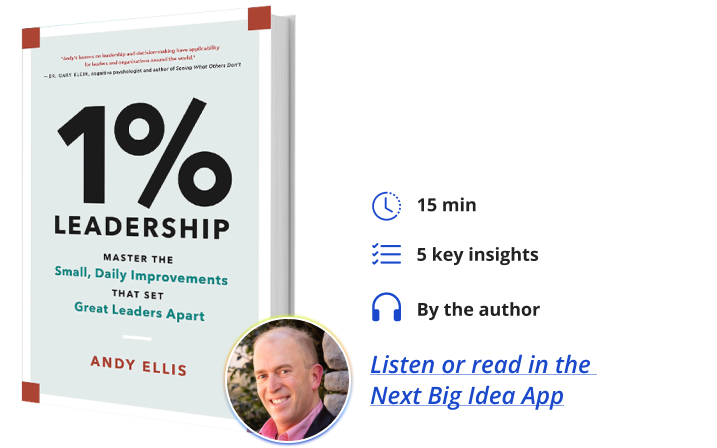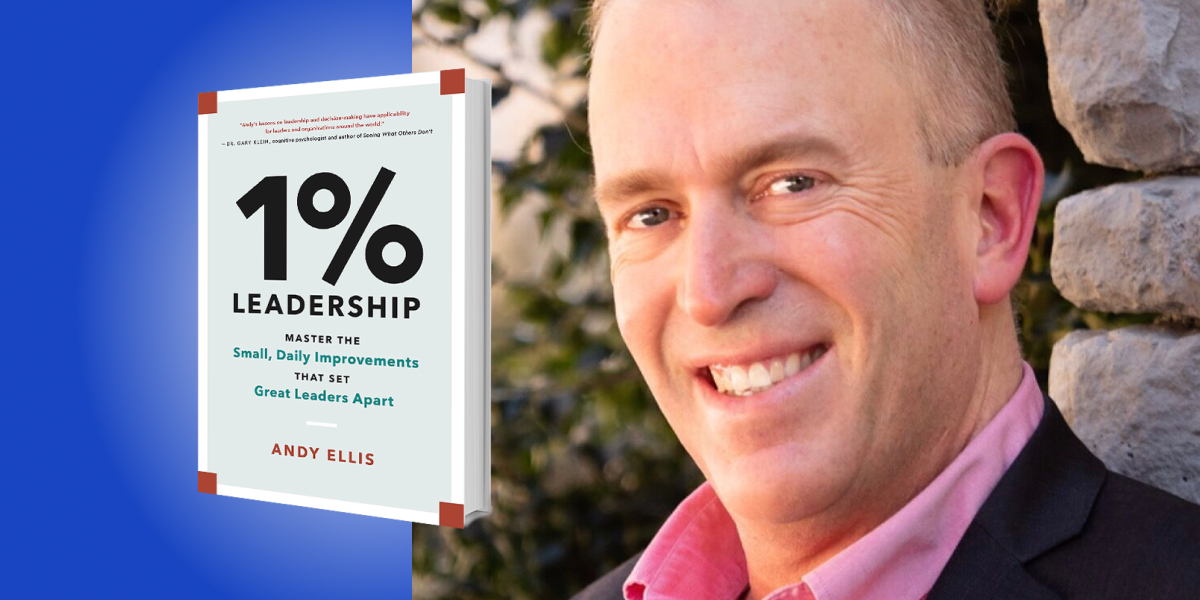Andy Ellis is a graduate of MIT and former U.S. Air Force officer. In his 20-year tenure, he designed, built, and brought to market many of Akamai’s security products, leading the Fortune 1,000 company from its start as a content delivery network into an industry powerhouse with a billion-dollar dedicated cybersecurity business. Andy is now the founder of leadership development firm Duha, where he teaches his leadership philosophy not only to other executives but strives to make leadership training more accessible to people at all career levels.
Below, Andy shares five key insights from his new book, 1% Leadership: Master the Small Daily Improvements that set Great Leaders Apart. Listen to the audio version—read by Andy himself—in the Next Big Idea App.

1. There is no single path to leadership and no one “secret trick” to being a great leader.
Leadership is a set of skills, and you don’t have to be just like anyone else and copy exactly the skills that made them successful. You could read Jack Welch’s biography and follow its lessons exactly, but not succeed in the way he did.
All too often, we hear about a new management or leadership buzzword, and everyone wants to go all in on adopting it wholeheartedly. Instead, identify your leadership skills, both your strengths and your “opportunities for improvement,” and see how new skills might fit into your style of leadership.
Develop your leadership skills a little bit each day, and even a one percent improvement is going to compound over time.
2. It can be dangerous to practice new skills.
Some environments are dangerous. Consider learning to swim. Perhaps you might pick up a book on swimming and read about the various strokes and core principles: keeping your head above water, not inhaling the water, etc. It might be filled with pleasant anecdotes about various swimmers, and stories about how swimming is a powerful tool that can change your life. Each of those anecdotes might give you a one percent improvement in your skills as you learn them.
You learn to swim not by jumping into the deep end, but by learning and practicing each of the individual skills in placid, shallow waters. As you get better, you continue to practice, because your mastery of those skills is never truly complete. Many work or leadership skills are similar. They require practice in small ways, rather than trying to do it all at once.
“You learn to swim not by jumping into the deep end, but by learning and practicing each of the individual skills in placid, shallow waters.”
But, you don’t just jump into any body of water to practice your swimming. The Charles River was toxic until the very end of the 20th century. Fraser Island is full of rip currents, sharks, and jellyfish. The Orinoco is rife with piranhas. This isn’t just the danger from jumping into the deep end before you can tread water; you might be jumping into a hostile environment that, at best, is indifferent to your continued existence. At worst, the environment actively wants to eat you.
So it goes with leadership advice. In a supportive environment, these ideas can bloom as you practice them. In an unsupportive environment? Some of these ideas can expose you to dangers from hostile colleagues. You’ll need to evaluate your environment—it might surprise or shock you—and decide how you’re going to practice your leadership skills in it. You also need to decide how you’ll help the people around you practice their skills.
3. Personal improvement is a prerequisite to leading professionally.
When people talk about authentic leadership, what they’re really looking for is someone who practices what they preach. You don’t have to be successful at everything you’ll ask others to try, but you’ll need to have tried them. You’ll also need to understand how and when those skills work, and when they don’t work.
Consider taking time to take care of yourself. We tell folks that it’s important to take vacation time to recharge their batteries, but do we do the same? I had a colleague who would, every year, take a big splashy vacation. He’d make sure to tell everyone that there was no cell phone reception where he was going for that week. The other 51 weeks of the year? He’d respond instantly to all communications and always follow up with questions, sending messages day or night, seven days a week. The clear subtext was that, outside of disappearing for one week a year, there was no expectation of taking time away. His message about time away from the office rang hollow to everyone around him.
“You don’t have to be successful at everything you’ll ask others to try, but you’ll need to have tried them.”
Great leaders make a point to disappear often to take care of themselves in visible ways. That way their teams understand that they can take care of themselves, too. That could be “I don’t work past 4 pm on Fridays,” or maybe it’s scheduling a medical appointment during the business day, letting people know you’re doing so. You get two benefits: first, if your leadership advice is good, then by following it yourself, you’re getting the same positive outcomes you’re telling other people to achieve. Second, people will believe you when you tell them that this advice matters.
4. If you don’t pay attention, you’ll miss the gorilla in the room.
Many leaders are familiar with the phrase, “Expect what you inspect,” which is a cautionary tale about getting more of whatever you measure. The flip side of that is spending more attention on measuring one outcome, while easily missing something you weren’t watching out for.
Consider cold sales outreach. My email inbox is, quite literally, full of outreach emails (as is my LinkedIn inbox). Most sales organizations are measuring Qualified First Appointments (QFAs), and, in their zeal to maximize QFAs, also measure inputs like “total calls made” or “total emails sent.” Marketing jumps in on this with “Marketing Qualified Leads.” We’re measuring one specific form of outreach, so we get more of it.
The vast majority of that outreach is never going to turn into a sale. Instead, this can be an indicator of where a brand is shining or tarnishing itself. A pushy sales rep might turn a future customer away, and we’ll never notice it. Look for ways that your measurements might be incentivizing harmful behavior, and look for signs that might be happening to you.
5. Inclusion is reducing the energy cost someone has to pay just to exist in a space.
If we think of work—corporate, community, or social—as spending energy to achieve value, then it’s pretty clear that a major function of leadership is minimizing the waste of energy. We destroy energy in misalignment of priorities when we throw work away, or when we assign work to people who can’t do that job. But the stress that our team goes through every single day just to show up to work is one of the biggest sources of wasted energy. Learning to identify how people are feeling excluded, so we can remove that energy drain, is a key leadership skill.
“There are dozens of ways that we as leaders increase energy costs for our team, and just as many ways to reduce them.”
As an example, I have some unique dietary restrictions. I can’t eat dairy or eggs, and I don’t eat pork or shellfish. At almost every event I attend, I spend time and energy trying to convince the organizer that I should be fed appropriately. Therefore, that energy isn’t invested in the event itself. There are a handful of events where I don’t have to worry about food. Those leaders have made sure that I show up at their event ready to go, unworried about how I’ll eat.
It’s not just food, of course. Do you schedule meetings that make it challenging for caregivers to deal with personal responsibilities? Are people afraid of being blamed when something goes wrong near them? Do people have to second-guess their plans because plans are changed behind closed doors? There are dozens of ways that we as leaders increase energy costs for our team, and just as many ways to reduce them.
To listen to the audio version read by author Andy Ellis, download the Next Big Idea App today:































